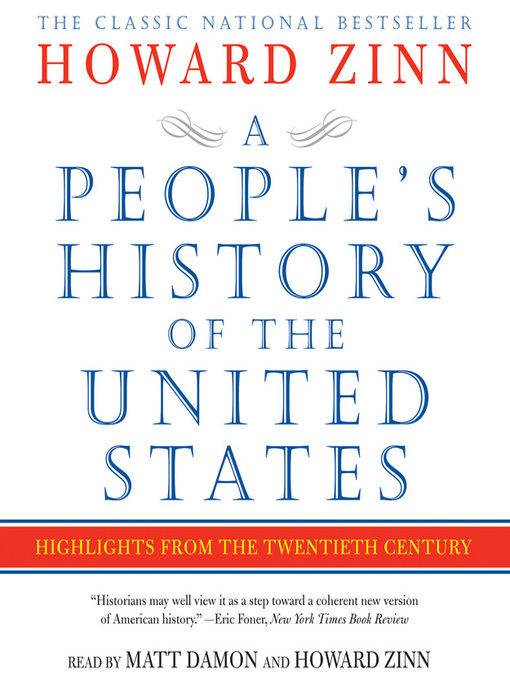
A People's History of the United States
Highlights from the 20th Century
فرمت کتاب
audiobook
تاریخ انتشار
2004
Lexile Score
1260
Reading Level
9-12
نویسنده
Matt Damonناشر
HarperAudioشابک
9780060754143
کتاب های مرتبط
- اطلاعات
- نقد و بررسی
- دیدگاه کاربران
نقد و بررسی

This book is well read but wrongly titled. A better title would be a history of radicalism in modern America. Matt Damon's reading captures the spirit of the text. Like the book, Damon's voice has an edge to it. He expresses the author's outrage regarding the exploitation of certain groups in American history. He also communicates Zinn's admiration for the courage and determination demonstrated by protest leaders. While Damon reads the main text, Zinn reads the introduction and conclusion. His is not an actor's voice, but his reading is evenly paced and authentic sounding. M.L.C. (c) AudioFile 2000, Portland, Maine

April 1, 2003
According to this classic of revisionist American history, narratives of national unity and progress are a smoke screen disguising the ceaseless conflict between elites and the masses whom they oppress and exploit. Historian Zinn sides with the latter group in chronicling Indians' struggle against Europeans, blacks' struggle against racism, women's struggle against patriarchy, and workers' struggle against capitalists. First published in 1980, the volume sums up decades of post-war scholarship into a definitive statement of leftist, multicultural, anti-imperialist historiography. This edition updates that project with new chapters on the Clinton and Bush presidencies, which deplore Clinton's pro-business agenda, celebrate the 1999 Seattle anti-globalization protests and apologize for previous editions' slighting of the struggles of Latinos and gays. Zinn's work is an vital corrective to triumphalist accounts, but his uncompromising radicalism shades, at times, into cynicism. Zinn views the Bill of Rights, universal suffrage, affirmative action and collective bargaining not as fundamental (albeit imperfect) extensions of freedom, but as tactical concessions by monied elites to defuse and contain more revolutionary impulses; voting, in fact, is but the most insidious of the"controls." It's too bad that Zinn dismisses two centuries of talk about"patriotism, democracy, national interest" as mere"slogans" and"pretense," because the history he recounts is in large part the effort of downtrodden people to claim these ideals for their own.

February 15, 2003
According to this classic of revisionist American history, narratives of national unity and progress are a smoke screen disguising the ceaseless conflict between elites and the masses whom they oppress and exploit. Historian Zinn sides with the latter group in chronicling Indians' struggle against Europeans, blacks' struggle against racism, women's struggle against patriarchy, and workers' struggle against capitalists. First published in 1980, the volume sums up decades of post-war scholarship into a definitive statement of leftist, multicultural, anti-imperialist historiography. This edition updates that project with new chapters on the Clinton and Bush presidencies, which deplore Clinton's pro-business agenda, celebrate the 1999 Seattle anti-globalization protests and apologize for previous editions' slighting of the struggles of Latinos and gays. Zinn's work is an vital corrective to triumphalist accounts, but his uncompromising radicalism shades, at times, into cynicism. Zinn views the Bill of Rights, universal suffrage, affirmative action and collective bargaining not as fundamental (albeit imperfect) extensions of freedom, but as tactical concessions by monied elites to defuse and contain more revolutionary impulses; voting, in fact, is but the most insidious of the"controls." It's too bad that Zinn dismisses two centuries of talk about"patriotism, democracy, national interest" as mere"slogans" and"pretense," because the history he recounts is in large part the effort of downtrodden people to claim these ideals for their own.
Copyright 2003 Library Journal, LLC Used with permission.

























دیدگاه کاربران